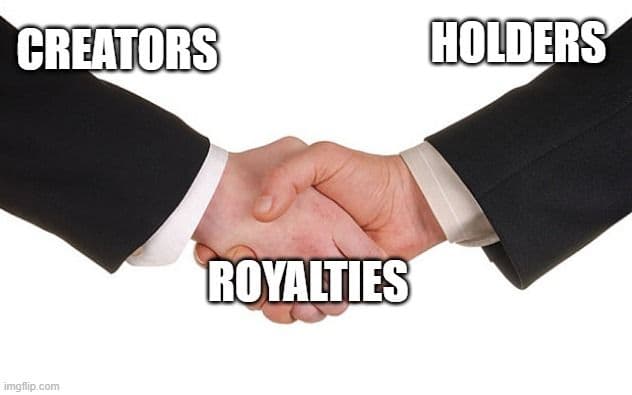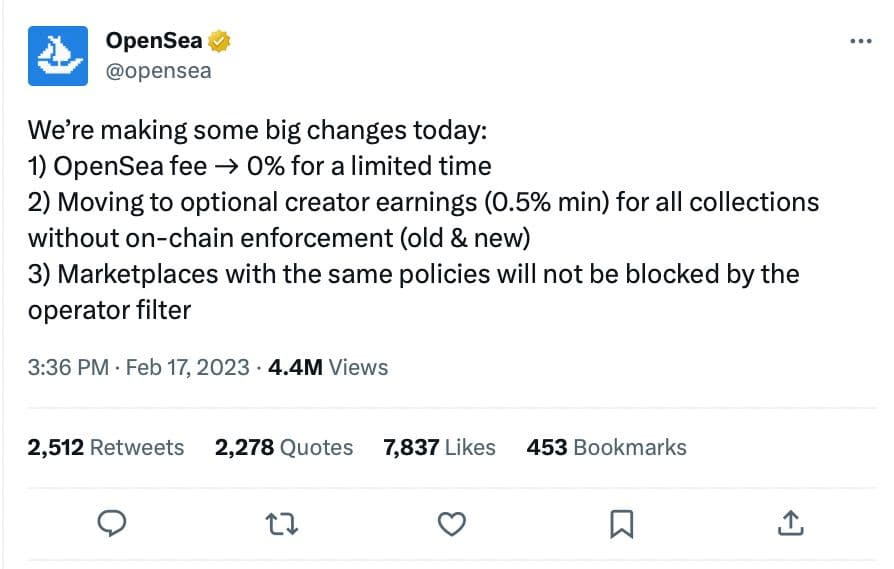Industry
Jun 15, 2023How Can NFT Creators Enforce Royalty Fees Once and For All?
Understanding the benefits of ERC721-C token standards for NFT creators and holders, and how they are eliminating the threat of 0% royalty fees on major NFT marketplaces.

In February 2023, the NFT community was rocked when major marketplaces like OpenSea and Blur implemented near-zero percent royalty fee policies in response to market declines. This sudden change left many prolific NFT creators feeling undervalued and prompted them to seek alternatives for showcasing their digital collectibles.
Shortly afterwards, Web3 Gaming Platform Limit Break introduced the concept of ERC721-C tokens, an extension of the ERC721 non-fungible token (NFT) standard on Ethereum. These tokens address the issue of diminishing creator royalties on major marketplaces. By granting enhanced control and customization to creators while rewarding collectors simultaneously, the ERC721-C token offers a sustainable solution that could enhance and revitalize the current NFT ecosystem.

Enhanced Control and Customizability
ERC721-C tokens empower NFT creators with increased control and customizability over their collections. These tokens are an extension of the Ethereum Request for Comment 721 (ERC721) non-fungible token standard, designed to provide enhanced functionality. With ERC721-C tokens, creators can embed royalty logic directly into the smart contract code, enabling them to define and experiment with various royalty settings.
By incorporating royalty logic on-chain, creators have the flexibility to reward early adopters, experiment with contingent royalties based on specific trade criteria, and explore innovative royalty models beyond traditional approaches. This level of control allows creators to adapt their royalty structures to fit their unique artistic vision and engage with their communities in new and exciting ways.
Enforceable On-Chain Royalties
One of the groundbreaking aspects of ERC721-C tokens is the introduction of enforceability on-chain. Unlike the traditional ERC721 standard, where royalties were enforced off-chain, ERC721-C tokens ensure that creators receive their deserved royalties for subsequent trades of their NFTs. This on-chain enforcement mechanism is achieved through the smart contract code, making royalty payments transparent, immutable, and reliable.
With enforceable on-chain royalties, creators can establish a sustainable revenue stream for their ongoing contributions. This incentivizes long-term engagement in projects, as creators can rely on recurring royalties to support their artistic endeavors. By ensuring fair compensation for creators within the NFT ecosystem, ERC721-C tokens foster a more equitable and rewarding environment for creators to thrive.
Reduced Marketplace Influence
ERC721-C tokens diminish the influence of NFT marketplaces over royalty payments. Traditionally, marketplaces had significant control over the enforcement of royalty payments, leading to reduced earnings and limited incentives for creators. However, with ERC721-C tokens, creators regain control over their royalties, reducing their reliance on marketplace policies.
By embedding royalty logic directly into the smart contract code, creators can set their own terms and conditions for royalty payments. This shift empowers creators to be compensated appropriately for their contributions and ensures that their artistic endeavors are recognized and rewarded. By reducing marketplace influence, ERC721-C tokens create a more equitable ecosystem that prioritizes the interests of creators, fostering a sustainable environment for innovation.
Innovative Royalty Models
ERC721-C tokens enable creators to explore a range of innovative royalty models, revolutionizing the way creators and collectors interact. These models go beyond traditional royalty approaches and provide creators with unprecedented flexibility.
Shared royalties, for example, allow creators to distribute royalty earnings between themselves and early adopters, fostering a sense of community and incentivizing participation. This model encourages collaboration and strengthens the bond between creators and collectors.
Minter-only royalties grant exclusive earning rights to the minters, acknowledging their crucial role in the creation process. This approach recognizes the value of minters and rewards them for their contribution, creating a fairer compensation model.
Contingent royalties introduce criteria-based conditions for royalty payments. Creators can set specific trade criteria that must be met before royalties are paid out. This approach ensures that royalties are earned based on predefined conditions, adding a layer of control and fairness to the royalty system.
Transferrable royalties allow creators to issue separate NFTs that grant holders the rights to future royalty income. These NFTs become valuable assets in themselves, providing collectors with a unique opportunity to invest in the potential success of creators and their artwork.
Final Thoughts
ERC721-C tokens are revolutionizing the NFT landscape by addressing the issue of dissolving creator royalties. With enhanced control and customizability, enforceable on-chain royalties, reduced marketplace influence, and innovative royalty models, these tokens empower creators and foster a sustainable NFT ecosystem. As more marketplaces adopt the ERC721-C standard, we can anticipate a paradigm shift in the relationship between creators and collectors. The potential for further advancements and collaborations in the NFT space is immense, opening up new possibilities for artists, collectors, and enthusiasts. By embracing ERC721-C tokens, we can shape a brighter future where creators thrive, collectors are valued, and the true potential of NFTs is realized.
About Chain
Chain is a blockchain infrastructure solution company that has been on a mission to enable a smarter and more connected economy since 2014. Chain offers builders in the Web3 industry services that help streamline the process of developing, and maintaining their blockchain infrastructures. Chain implements a SaaS model for its products that addresses the complexities of overall blockchain management. Chain offers a variety of products such as Ledger, Cloud, and NFTs as a service. Companies who choose to utilize Chain’s services will be able to free up resources for developers and cut costs so that clients can focus on their own products and customer experience. Learn more: https://chain.com.
Connect with Chain for the latest updates.
Twitter: twitter.com/Chain
Telegram: t.me/Chain & https://t.me/ChainAnnouncements
Medium: blog.chain.com
Instagram: instagram.com/Chain
Facebook: facebook.com/Chain
YouTube: youtube.com/chain
Chain News & Updates
Latest News & Updates
Sign up for the Chain Newsletter - a weekly roundup of new platform features and the latest from the industry.
